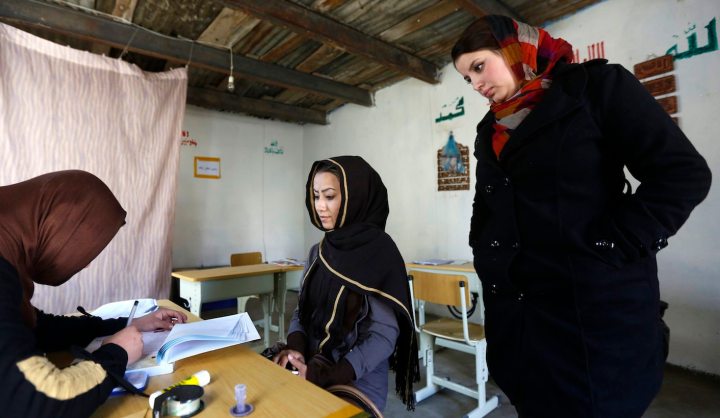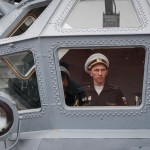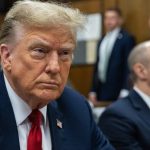Newsdeck
Lack of cash and monitors add to Afghan election troubles

Organisers of Afghanistan's make-or-break presidential election next year say poor security, a shortage of monitors and funding holes are undermining their ability to safeguard the process from the widespread fraud that marred the last poll in 2009. By JESSICA DONATI and HAMID SHALIZI
Another deeply flawed election would undermine the attempts of Washington and its allies to foster democracy ahead of the withdrawal of foreign troops later in 2014.
“The foundation of the election due to technical issues was not done in the proper way,” said Noor Mohammad Noor, spokesman for the Independent Election Commission (IEC). “We need measures to secure the process through observers.”
Western nations, who have spent hundreds of billions of dollars on a conflict that has failed to end the Taliban insurgency, have pledged about a third less cash to the United Nations (UN) fund that will cover most of the election’s costs compared with 2009, official U.N. figures shows.
The reduced budget is partly because some land and equipment that had to be bought last time is being reused and fewer foreign advisers are needed, say the U.N. and IEC chief Yousof Nooristani.
“They were drawing good salaries out of this budget… but now there is very limited number of foreigners and everything will be done by the Afghans,” said Nooristani of the advisers, whose number will drop from 160 last time to a maximum of 60.
On the ground, however, the signs are not encouraging.
Corruption among election staff is rife, according to both UN and Afghan sources, and even those that want to remain independent fear their lives may be in danger if they try to stop fraud. Many key roles in the IEC remain vacant just five months before the poll.
There is also a severe shortage of female staff, which threatens to exclude most women from voting and makes polling stations for women harder to monitor and so more vulnerable to cheating.
More than a third of the country’s 34 provinces may be so dangerous in some areas that some polling stations will not be able to open.
“In previous presidential election… observers were not able to monitor more than 30 percent of the country due to security reasons,” said Zakria Barekzai, a veteran IEC commissioner who resigned two years ago and is now head of Afghanistan Democracy Watch, an independent observer.
“Security has deteriorated over the years and that has badly affected how the election will be held.”
In a further threat to the election’s credibility, there are 19 million voter cards in circulation, but just 13 million eligible voters – and cards trade like a commodity.
The IEC requested a new voter card system to be rolled out to solve the problem false or duplicate cards in circulation, but could not get it funded.
“The international community refused to support it financially,” said Noor.
Major Western contributors say they are not scaling back their financial commitment, and the United Nations Assistance Mission in Afghanistan (UNAMA) says the budget for the election was agreed between Afghanistan and its donors.
But the Independent Electoral Complaints Commission (IECC) charged with investigating complaints of fraud and foul play -already now in the hundreds – says workers have not been paid since starting months ago.
“We are facing difficulties with financial assistance and budget,” said IECC spokesman Nader Mohseni. “UNAMA promised to assist this commission but we haven’t received anything yet.”
The commission also says it was unable to open provincial offices because it has no money.
“UNAMA has brought the issue to the attention of the government and donors,” a UNAMA spokesman said, referring to unpaid salaries. “The IEC is in the process of filling the department head positions that have been vacant for some time.”
Senior UN officials interviewed by Reuters said donors were increasingly fed-up with systemic corruption in Afghan institutions and were more reluctant to invest in next year’s election.
International donors gave more than $200 million to the fund run by the United Nations Development Programme to organise the 2009 poll and also funded large international monitoring missions.
In 2009, despite the large investment, more than a millionvotes were thrown out amid accusations of systematic vote-rigging that tarnished President Hamid Karzai’s re-election for a second term.
For the 2014 vote, donors have agreed to a price tag of just under $130 million and plan to fund fewer international monitors than in the last election, despite U.N. pleas to support as many as possible.
Even though their movements may be restricted for security reasons, one senior official explained, the presence of internationals boosted the confidence of domestic observers. In addition, they could become a point of reference for IEC polling station staff to go to with complaints – in the absence of support from the government or their bosses.
The United States is committing about 15 percent less to the 2014 election fund than last time, pledging $55 million.
Its aid agency also backed the international non-profit mission numbering over 100 observers, but may not fund any international groups in 2014.
“This time around the international community is focusing on strengthening domestic observer groups,” a USAID spokesman said, adding that it would announce which ones it was funding at the end of the year or in January.
But domestic monitors say funding is needed urgently and by this stage last year they already had the cash needed to train staff and organise logistics.
“This time there is less interest. None of the main donors have come to the country yet to speak about the concerns and funding,” said Jandad Spinghar, head of Afghanistan’s largest domestic monitor, the Free and Fair Election Foundation of Afghanistan (FEFA).
“It is getting late now. We have to hire observers from across the country and every move incurs a cost.”
The European Union’s pledged contribution has fallen more than 70 percent to $13.2 million, the biggest reduction among the top 10 donors. The EU said the figures were accurate, but said its overall contribution had not yet been fixed.
“On current projections, our funding is scheduled to be almost identical to the 2009 level,” said an EU official. “It is possible that further funding may even mean it will exceed the funding for the 2009 elections.”
The weak safeguards in place have left the election exposed to fraud by corrupt officials and the credibility of vote now depends on local and international monitors, according to IEC commissioner Sareer Ahmad Barmak.
Barmak said it was hoped that monitors would be spread across most of the country, but in reality, 50 percent coverage would be a good result.
UN officials interviewed by Reuters agreed that a shortcoming of observers was likely on the day.
“There will never be enough observers,” said a second U.N. official, who also asked to remain anonymous because he is not authorized to speak to the press. On the question of staffing for female polling stations he said: “this is a challenge that no one has an answer to right now.” DM
(Additional reporting by Abdul Aziz Ibrahimi; Editing by Alex Richardson)
Photo: An Afghan woman gets her registration card done at a voter registration centre in Kabul. (REUTERS/Mohammad Ismail)




















 Become an Insider
Become an Insider